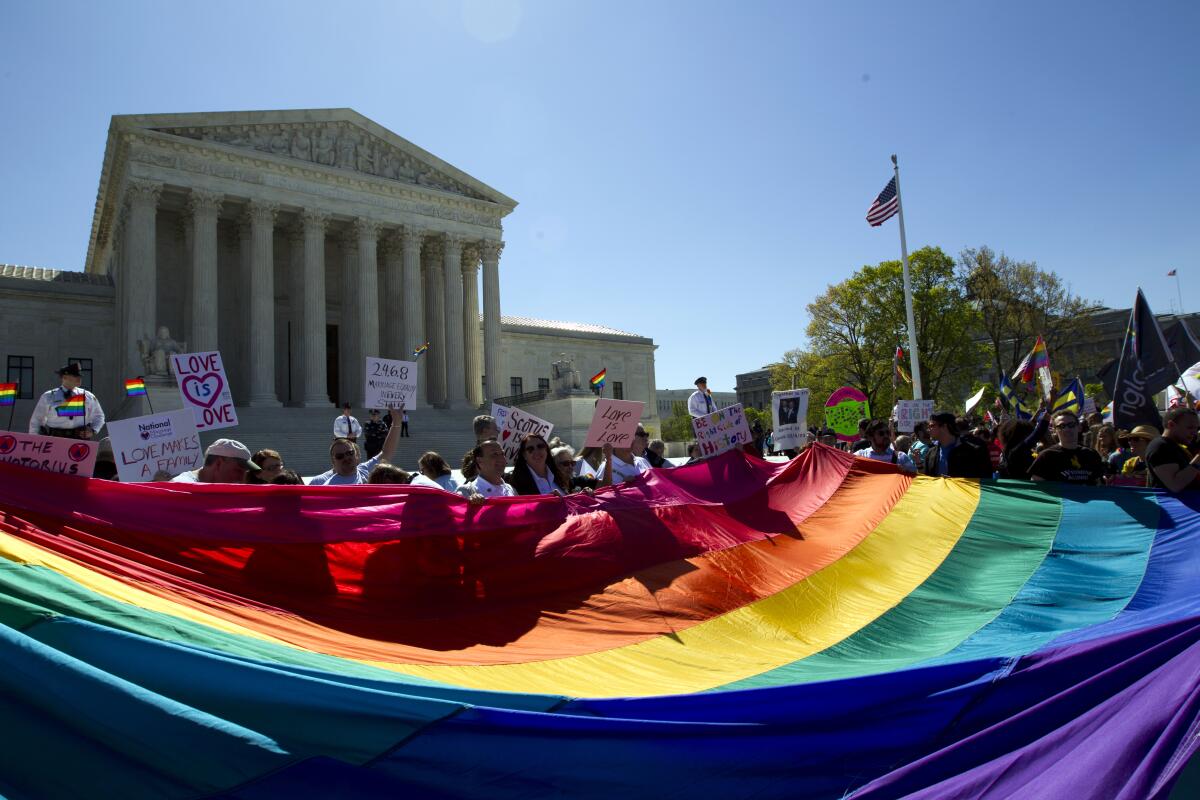Expect the battle for civil rights to move to statehouses. LGBTQ rights are at risk

- Share via
The imminent reversal of Roe vs. Wade is likely to be the first step in a campaign to rescind a raft of legal rights and protections that the Christian nationalist right in America finds objectionable.
The strategy is to turn constitutionally protected rights into political questions at the state level. In addition to state-by-state fights over abortion access, expect a battle to be waged by GOP evangelicals against LGBTQ rights state by state.
Two decades of gains in federal protections for LGBTQ Americans have largely been based on recognition of a constitutional right to privacy, a right rejected by the leaked draft opinion overturning Roe. That opinion tells us that a majority of the justices on the Supreme Court may no longer see queer Americans as worthy of equal protection under federal law.
The foundation of LGBTQ rights has long been fragile. These protections have been notoriously difficult to entrench in federal legislation. The Equality Act, which would ban discrimination on the basis of sexual orientation or gender identity, is stuck in the Senate, and transgender rights are, if anything, regressing nationwide.
Without a constitutional right to privacy, activists on both sides will shift their focus to states.
The far-right Republican strategy will not be to invalidate gay marriage immediately but rather to diminish equality by allowing states to enshrine discrimination against queer people in areas like adoption, partner benefits, schooling and public accommodations.
The less we can count on federal protections, the higher the stakes in state politics and courthouses. Many states already have laws on the books to protect same-sex marriage and to bar LGBTQ discrimination in employment and housing. But more than a dozen states have no explicit ban on discrimination over sexual orientation or gender identity. And in some, conservatives have gone on the offensive to enact hateful new laws.
Republicans have already signaled that they will make schools and children the next battleground: “Don’t say gay” laws to muzzle public school teachers are sweeping the nation, and attacks on trans girls playing sports resonate with religious conservatives. Sadly, invoking the trope that LGBTQ people are pedophiles “grooming” vulnerable children works with a bloc of voters who can swamp a GOP primary.
Because of redistricting and polarization, statehouse districts are now almost entirely won and lost in primaries. To woo an enthusiastic base for those low-turnout elections, Republican candidates court the anti-gay extremes. That is the clearest path to election. White evangelicals made up only 19% of the voting public nationwide in 2020 but constituted 34% of all Trump voters and an even higher proportion in the Southern and Midwestern states where “identity” rights are a red rag to a bull.
The anti-gay Christian nationalist movement is also wealthier and better organized than gay rights proponents. The strategic acumen of the Alliance Defending Freedom, a leading anti-LGBT group, makes it a much more pernicious and powerful organization than most Americans realize. The ADF effectively runs anti-trans and “don’t say gay” legislation campaigns throughout the U.S. The Southern Poverty Law Center notes that the organization raises and spends millions of dollars a year supporting anti-LGBTQ mobilization in America and overseas, including drafting legislation, and providing lawyers and campaign strategy advice.
That kind of extremist and regressive thinking ought to be on the way out. Even in many of the states enacting anti-LGBTQ legislation, a majority of voters support gay rights. Eight in 10 Americans, and 65% of Republicans, support nondiscrimination laws. Marriage equality has support from 70% of Americans. There are steeply rising numbers of self-identifying LGBTQ people (including 21% of Gen Z). In states considering “don’t say gay” bills this year, there are at least 31 out queer statehouse members.
Although the political game is stacked against them in many states, the pro-equality folks will have the tide of history — and growing public support — on their side. But in the shorter term, they are likely to lose legislative battles as these state-by-state conflicts heat up.
Over the next few years, we should expect to see an increasingly polarized America when it comes to LGBTQ rights. Transgender people will be demonized in red states and slowly recognized and validated in blue states. Gay, lesbian and bisexual Americans will see their rights curtailed in red states that may reverse the recent phenomenon of queer Americans being able to live and flourish in conservative states. We may see a return to the days of exodus when LGBTQ people felt pushed and pulled to the big, coastal, gay-friendly cities.
But eroding federal protections won’t alter a changing culture. Homophobia is no longer the majority view of the American public. The growing visibility of queer people in public life has shattered stereotypes and built empathy. The question is: Will the silent, more moderate, Republican majority find attacks on their LGBTQ neighbors too hard to stomach?
Andrew Reynolds is a senior research scholar in the School of Public and International Affairs at Princeton University.
More to Read
A cure for the common opinion
Get thought-provoking perspectives with our weekly newsletter.
You may occasionally receive promotional content from the Los Angeles Times.









